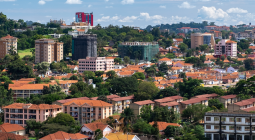Africa Climate Week in Kampala Postponed.

Bonn, 6 March 2020 -The UN Climate Change secretariat, in close collaboration with all the other organizing partners, has decided to put Africa Climate Week in Kampala on hold. This is to ensure the health and safety of all participants in light of the Coronavirus (COVID-19).
The meeting, which was planned to take place 20 to 24 April 2020, is only postponed and not canceled, and will take place at a later time that has yet to be determined.
The Ministry of Health of Uganda has issued guidance that arrivals in Uganda from the most affected countries will be held quarantine in government hospitals if they display symptoms, or will be placed in self-isolation for 14 days if they do not display symptoms.
In light of this, the United Nations Department of Safety and Security (UNDSS) has requested that events and workshops with participants from affected countries to be placed on hold so as not to contravene instructions from the Government of Uganda and for the safety and wellbeing of UN personnel working in Uganda.
Uganda will remain the host country, and preparations will continue to ensure the best possible results of the meeting, designed to share ways for governments to implement the Paris Agreement in Africa and to serve as a platform for national governments and non-Party stakeholders to engage, build partnerships and explore solutions that can deliver climate action and support at scale.
Africa Climate Week is being hosted by the Republic of Uganda. Key partners are UN Climate Change, the World Bank Group, the UN Development Programme, the UN Environment Programme, the UN Economic Commission for Africa, the African Union and the African Development Bank.
Read more about Africa Climate Week here.
In case of questions, please write a message to Climate-Week@unfccc.int
For media enquiries, please contact: jhay(at)unfccc.int
UNFCCC Press Office: press(at)unfccc.int
About the UNFCCC
With 197 Parties, the United Nations Framework Convention on Climate Change (UNFCCC) has near universal membership and is the parent treaty of the 2015 Paris Climate Change Agreement. The main aim of the Paris Agreement is to keep a global average temperature rise this century well below 2 degrees Celsius and to drive efforts to limit the temperature increase even further to 1.5 degrees Celsius above pre-industrial levels. The UNFCCC is also the parent treaty of the 1997 Kyoto Protocol. The ultimate objective of all agreements under the UNFCCC is to stabilize greenhouse gas concentrations in the atmosphere at a level that will prevent dangerous human interference with the climate system, in a time frame which allows ecosystems to adapt naturally and enables sustainable development.
See also: http://unfccc.int
6 March 2020
United Nations





